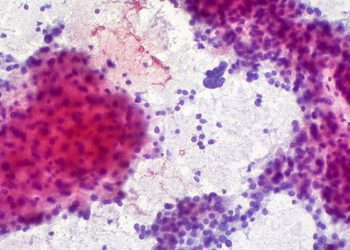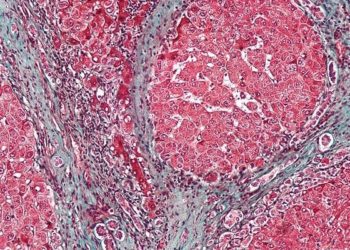High hepatitis B antigen predicts hepatic cancer recurrence
Image: PD
1. The risk of hepatocellular carcinoma recurrence increased with high levels of hepatitis B surface antigen (HBsAg), specifically at HBsAg above 1000 IU/mL.
2. Both 5-year disease-free survival and overall survival was lower in patients with high HBsAg levels, despite low viral loads.
Evidence Rating Level: 2 (Good)
Study Rundown: Partial hepatectomy is often an effective treatment option for hepatocellular carcinoma (HCC). Like in other cancers, it is important to identify risk factors for recurrence of HCC following treatment. This study looked at Hepatitis B (HBV) positive patients with HCC and found that high preoperative HBsAg levels increased the risk of tumor recurrence after partial hepatectomy, even in absence of high viral loads. This study suggests that HBsAg levels should be used as a prognostic factor for tumor recurrence in this patient population. Although it analyzed a large number of patients, this study is limited by its retrospective nature and its restriction to one academic center. Early tumor occurrence was not associated with high HBsAg levels, and after excluding those with early recurrence, authors were able to show an association with late tumor recurrence. This demonstrates that the 5-year follow-up period was likely too short to capture potentially large differences in disease-free and overall survival rates associated high HBsAg levels.
Click to read the study in JAMA Surgery
Relevant Reading: High Levels of Hepatitis B Surface Antigen Increase Risk of Hepatocellular Carcinoma in Patients With Low HBV Load
In-Depth [retrospective cohort]: This study performed a retrospective analysis of 1062 patients who previously underwent partial hepatectomy for HBV-related HCC and had a low preoperative HBV viral load. Patients who had antiviral therapy, hepatitis C, anti-HBs antibody positivity, and major early complications or death were excluded. The patients were divided into three groups based on preoperative HBsAg level: less than 100 IU/mL, 100 to 999 IU/mL and 1000 IU/mL or greater. The 5-year disease-free survival (DFS) rates were 48.9%, 43.8% and 34.1% respectively, and the overall survival rates were 59.3%, 56.0% and 48.8% respectively. DFS of patients with HBsAg <999 IU/mL(groups 1 and 2) was significantly greater than in those with the highest preoperative HBsAg level (46.1% vs. 34.1% p=0.002). The difference between the first two groups was not statistically significant. Similarly, the 5-year overall survival rates were higher in the low-HBsAg groups compared to the high-HBsAg group (57.5% vs. 48.8% p=0.004). Preoperative HBsAg level higher than 1000 IU/mL was also associated with a high risk of tumor recurrence in this population (hazard ratio 1.23, 95% CI 1.04-1.44, p=0.1), along with seropositivity for HBeAg, tumor size greater than 5 cm, blood transfusion, surgical margin of less than 1 cm, presence of satellite nodules and portal vein thrombosis. Early tumor recurrence was not associated with high HBsAg, but late tumor recurrence was associated with high HBsAg (in the patients without early tumor recurrence).
More from this author: Feeding tube improves outcomes after rectal resection, Symptomatic relief possible with surgery for metastatic bowel obstruction, Preperitoneal mesh placement a valid option for ventral hernia repair, Surgeons may be unaware of own level of burnout, Home Calculator may predict likelihood of home discharge after surgery
©2012-2014 2minutemedicine.com. All rights reserved. No works may be reproduced without expressed written consent from 2minutemedicine.com. Disclaimer: We present factual information directly from peer reviewed medical journals. No post should be construed as medical advice and is not intended as such by the authors, editors, staff or by 2minutemedicine.com. PLEASE SEE A HEALTHCARE PROVIDER IN YOUR AREA IF YOU SEEK MEDICAL ADVICE OF ANY SORT.





